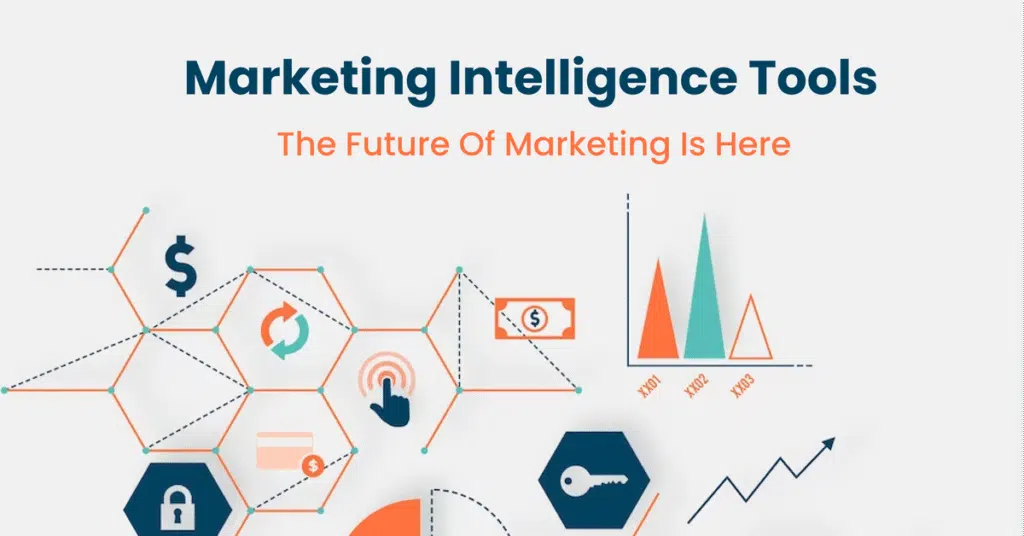Just like a healthy body needs the right diet, a healthy business needs the right data. Today, businesses, regardless of their size, are increasingly data-driven. There are no decisions, even the smallest, based on the unknown. Every business decision and strategic plans are based on data.
Analysts and marketers are increasingly relying on sophisticated market intelligence tools to manage data. Market intelligence tools are a great way to integrate data, obtain real-time analytics, visualize data, and generate reports. There are many options available when it comes to market or business intelligence tools. Unfortunately, not one tool is comprehensive; each of them has its unique aspects. A business needs a combination of business intelligence tools to successfully generate, analyze, and decode data.
This is no easy task, that’s why we have put together this guide in which we discuss what market intelligence tools are & their role in business success, some competitive intelligence tools, their features, etc.
What Are Market Intelligence Tools & Why Are They Important?
Market intelligence tools are designed to automate and simplify complex data and data-related tasks, like:
- Providing data on campaign performance and competitive market trends.
- Data sorting, unifying, and managing.
- Collecting data from multiple sources and gathering it in a centralized destination.
- Analyzing and generating insights.
- Transferring it to the right people and in the right format.
- Sending integrated data to visualization software or others, e.g., ChatGPT.
They collect data from multiple sources like Meta, Shopify, Google Analytics, etc., at one location to give you a clear idea.
Now, coming to the importance of market intelligence tools.
Business decisions today are not based on employee intuition and experience. Companies, small, medium, and large, rely completely on data to make decisions and strategic actions. Whether it’s a new product development, planning social marketing campaigns, or deciding what to sell and where, every decision is driven by data.
Here are some areas where market intelligence tools benefit businesses:
- Enables strategic decision-making by providing insights on market trends, competitor analysis, customer behaviour, and other vital factors.
- Business intelligence tools give accurate data that’s both reliable and up-to-date. This helps marketers to make solid business decisions and avoid any misoccurrences caused by wrong/ old data. It also assists decision-makers in allocating the right resources to the right areas to gain maximum ROI.
- These tools also give a clear view of what’s working and what needs improvement by ensuring data consistency.
- Market intelligence tools also leverage historical data and advanced analytics to predict market trends in advance. This gives companies a competitive advantage to plan their strategies and stay ahead of the competition.
Important Criteria To Look For In Market Intelligence Tools

1. Data Integration
Top data integration tools must integrate data in one centralized location for data consistency and efficiency. You must be able to view complete data on one platform.
2. Advanced Features & Analytics
Businesses should look for tools that possess in-depth analytics capabilities, data quality monitoring, and AI-generated features. These features lead to accurate data for trend prediction, campaign generation, and strategic decisions.
3. User-Friendly Navigation
Market intelligence tools with clear navigation, simple and well-designed dashboards should top your list. The user-friendly navigation ensures quick learning by employees and quick deployment within teams.
4. Effective Support & Training
A good market intelligence tool should come with great customer support to quickly resolve queries and customer issues. Also, look for detailed tutorials and complete training resources.
5. Integration With Different Tools
This tool should be able to connect with other tools like CRMs, email marketing software, data visualization tools, and AI-powered tools. A seamless integration ensures a more productive workflow, decreased data silos, and increased efficiency.
Top 5 Market Research Tools for B2B Companies

We have provided the top 5 best competitive intelligence software based on features and customer reviews. These tools can be used in combination with each other as they have unique offerings that complement each other to take your business towards success:
1. Hubspot
Hubspot is one of the most well-known and comprehensive market intelligence platforms. It offers marketing automation, CRM, and analytics. It has an easy-to-use interface and is highly scalable, making it one of the best choices for performance analysis, lead generation, and customer engagement.
Features of the Hubspot competitive intelligence platform:
- Deep analytics
- Customized reports
- Lead generation
- Marketing automation
- Full-suite CRM
Customer Review (on G2): 4.4 out of 5, rated by 12,748 customers.
2. Salesforce
Salesforce is an ideal choice for large-scale organizations due to its advanced CRM. Enterprise teams can leverage it to analyze customer behaviour and track sales performance.
Features of the Salesforce competitive intelligence platform:
- Comprehensive reporting
- Personalized dashboards
- Extensive analytics
- AI-driven insights
Customer Review (on G2): 4.4 out of 5, rated by 84,995 customers.
3. Semrush
A complete market intelligence software that emphasizes competitive analysis, search engines, and content marketing. Companies use Semrush primarily for guiding SEO campaigns, checking keywords, and analyzing competitors’ online visibility.
Features of the Semrush competitive intelligence platform:
- Rank tracking and site audit
- Keyword research and performance analysis
- Tools for comprehensive content marketing and analysis
- Scheduling and monitoring of social media campaigns
- Analysis and management of PPC campaigns
Customer Review (on G2): 4.5 out of 5, rated by 2,715 customers.
4. Ahrefs
Ahrefs and Semrush offer more or less the same features and analytics, but what makes Ahrefs better is its pricing structure. It is a great solution for teams looking for comprehensive features at competitive pricing. Ahrefs is a powerful suite of SEO tools, including site audits, keyword research, and backlink analysis.
Features of the Ahrefs competitive intelligence platform:
- Backlink analysis and monitoring
- Advanced keyword research
- Performance optimization and SEO audits
- API access
Customer Review (on G2): 4.5 out of 5, rated by 564 customers.
5. Sprout Social
Sprout Social is a hugely popular marketing intelligence and automation software. It is a comprehensive social media analytics solution that offers end-to-end social media management, including analysis and scheduling of social media content to drive growth and ROI.
Features of the Sprout Social competitive intelligence platform:
- Scheduling and publishing social media content
- Analysis and performance reporting
- Social listening to track customer engagement
- Task management & team collaboration tools
Customer Review (on G2): 4.4 out of 5, rated by 4,438 customers
In Conclusion,
Marketing intelligence tools are modern solutions that every business must leverage for data analysis, tracking, and reporting. These tools give businesses data for decision making and strategic planning that results in increased ROI. It ensures that you beat the competition and utilize clever marketing tactics in your business plan to stay way ahead of others.
One is never enough when it comes to market intelligence tools. As already discussed, each tool has a set of benefits that the other does not have. To achieve success, you must select the right list of these tools and combine their benefits.
We have provided you with a list of the top 5 most popular market intelligence tools with their features. You can either choose them or explore others readily available online.
Related: How To Become A Python Developer? A Detailed Guide
Related: What Is DPaaS? Benefits, Features and Future of Data Protection








